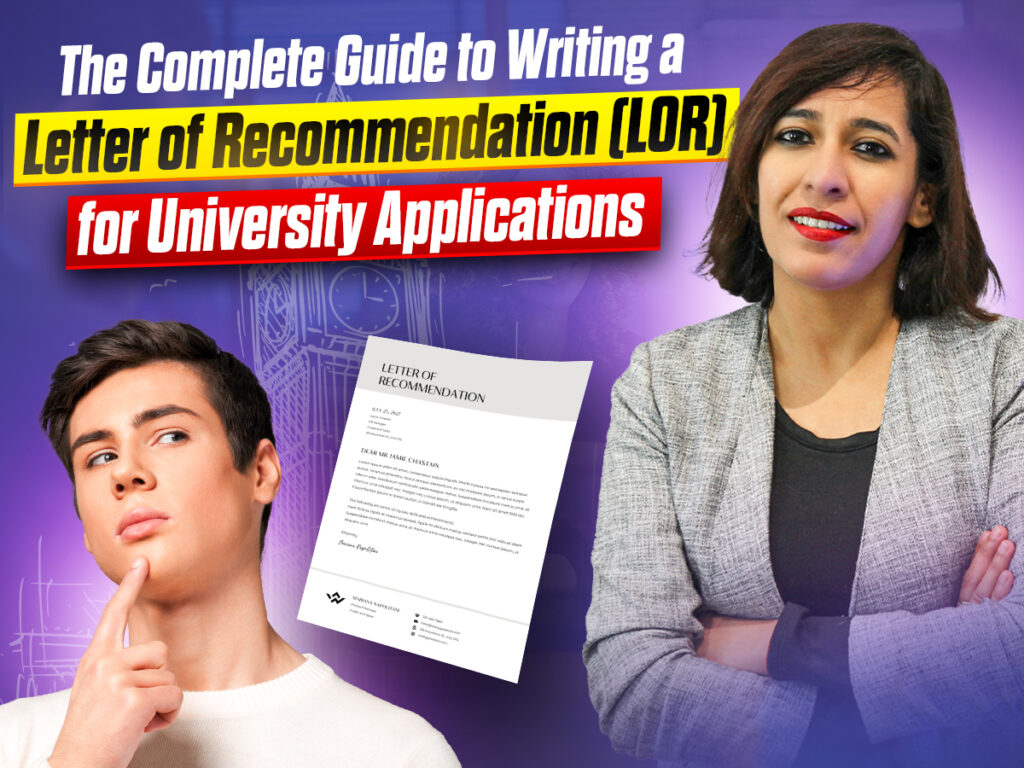Building a strong university application profile is essential for international students aiming to secure admission to their desired programs in 2025. This process involves crafting compelling documents, including a Statement of Purpose (SOP) and Letters of Recommendation (LOR). Here’s a complete guide on how to effectively prepare these components and enhance your application.

Understanding the Importance of SOP and LOR for University Applications
Statement of Purpose (SOP)
The SOP is a critical document that outlines your academic background, professional aspirations, and reasons for choosing a specific program and institution. It provides admissions committees with insight into your motivations and suitability for the course.
Letters of Recommendation (LOR)
LORs are endorsements from individuals who can vouch for your abilities and character. They should highlight your strengths, achievements, and potential contributions to the university community. Strong LORs can significantly bolster your application by providing a third-party perspective on your qualifications.
Crafting an Effective Statement of Purpose
1. Research University Requirements
Before writing your SOP, familiarize yourself with the specific guidelines provided by the universities you are applying to. Different institutions may have varying requirements regarding format, length, and content focus. Typically, SOPs range from 500 to 1,000 words.
2. Structure Your SOP
A well-structured SOP enhances readability and clarity. Consider the following format:
- Introduction: Start with a hook that captures attention. Briefly introduce your academic interests and long-term goals.
- Academic Background: Discuss your previous education, relevant coursework, projects, or research experiences that have prepared you for this program.
- Professional Experience: If applicable, describe any internships or work experiences related to your field of study. Highlight specific skills gained during these experiences.
- Reasons for Choosing the Program: Explain why you are interested in this particular program and how it aligns with your career aspirations. Mention faculty members, research opportunities, or unique aspects of the program that attract you.
- Conclusion: Summarize your key points and express enthusiasm about the opportunity to contribute to the university community.
3. Personalize Your Content
Avoid generic statements by tailoring your SOP to reflect your unique experiences and aspirations. Use specific examples to illustrate your points and demonstrate how they relate to your chosen field.
4. Proofread and Seek Feedback
After drafting your SOP, proofread it multiple times to catch grammatical errors or awkward phrasing. Consider seeking feedback from trusted peers or mentors who can provide constructive criticism. Their insights can help you refine your SOP further.
Writing Compelling Letters of Recommendation
1. Choose Appropriate Recommenders
Select individuals who know you well and can provide detailed insights into your abilities. Suitable recommenders include:
- Academic Recommenders: Professors or teachers who can speak about your academic performance and potential.
- Professional Recommenders: Supervisors or managers who can discuss your work ethic, skills, and contributions in a professional setting.
2. Provide Context to Recommenders
When approaching potential recommenders, provide them with information about the programs you are applying to, along with details about your achievements and goals. This context will help them write more personalized letters.
3. Structure of the LOR
A well-organized LOR typically includes:
- Introduction: The recommender should introduce themselves, their relationship with you, and their qualifications for writing the letter.
- Body Paragraphs: Highlight specific strengths, skills, and experiences that make you a suitable candidate for the program:
- Discuss academic abilities or relevant projects.
- Mention leadership qualities or teamwork experiences.
- Provide examples of problem-solving skills or innovative thinking.
- Conclusion: End with a strong endorsement of your candidacy for the program.
4. Maintain Professional Tone
Ensure that the LOR is written in a formal yet personal tone. The language should be clear and straightforward while effectively conveying the recommender’s genuine support for your application.
Common Mistakes to Avoid
For SOP:
- Being Too Generic: Avoid using clichés or vague statements; instead, focus on specific experiences.
- Ignoring Guidelines: Always adhere to word limits and formatting requirements specified by universities.
- Neglecting Proofreading: Submitting an SOP with grammatical errors can detract from its professionalism.
For LOR:
- Using Generic Templates: Each LOR should be tailored to reflect individual strengths rather than using a one-size-fits-all approach.
- Choosing Inappropriate Recommenders: Ensure that recommenders are familiar with your work; letters from distant acquaintances may lack depth.
- Failing to Provide Context: Without context about the program or specific qualities to highlight, recommenders may struggle to write effective letters.
Conclusion
Building a strong university application profile requires careful preparation of both your Statement of Purpose and Letters of Recommendation. By understanding what each document entails and following best practices for writing them, you can significantly enhance your chances of admission in 2025.
Start early in the application process, seek feedback from trusted advisors, and remain authentic in showcasing who you are as an applicant. With dedication and thoughtful preparation, you can create a compelling application that stands out in a competitive landscape!
For more assistance and resources, explore the YOUR KNOWLEDGE BUDDY website, where you can find additional support for your study abroad journey.
Catch me on LinkedIn | Instagram | YouTube
FAQs About SOP and LOR for University Applications
1. What should I include in my Statement of Purpose (SOP)?
Your SOP should cover your academic background, professional experience, reasons for choosing the program, and how it aligns with your career aspirations. Personalize your content to reflect your unique journey.
2. Who should write my Letters of Recommendation (LOR)?
Academic recommenders such as professors and professional recommenders like supervisors are ideal for writing your LOR. Choose individuals who know you well and can speak to your strengths.
3. How long should a Statement of Purpose be?
SOPs typically range between 500 and 1,000 words. Always check the specific word limit requirements set by each university.
4. How can I ensure my LOR stands out?
Provide your recommenders with context about your achievements and the programs you’re applying to. Encourage them to use specific examples that highlight your strengths and unique contributions.
5. Can I use the same SOP and LOR for multiple universities?
It’s best to tailor each SOP to the specific program you’re applying to, as this demonstrates genuine interest. LORs can be similar but should still be personalized for different institutions.

